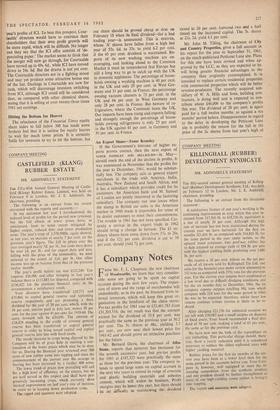Investment Notes
By CUSTOS
T was a clever move on the part of Mr. Paul I Chambers to offer the shareholders of cowl- TAULDS the alternative of £25 of new 6+ per cent. convertible unsecured loan stock for every £10 of Courtaulds ordinary stock. Assuming that this stock would be quoted in the market at par— in spite of the possible existence of £200 million of it—it puts a value of 50s. on Courtaulds and gives their shareholders an immediate increase in income of over 60 per cent. Moreover, the conversion rights can be exercised in December, 1963-65, inclusive, covering a period which, ac- cording to Mr. Chambers, will see the profits of Kt exceeding those of the record year 1960 and continuing upwards. If and when the two com- panies are merged the combined. profits should increase by £21 million, or 4 per cent. on last year's profits of ICI. To beat this prospect, Cour- taulds' directors would have to convince their shareholders that their own profit growth will be more rapid, which will be difficult. No longer can they say that the ICI offer consists of 'de- preciating paper.' The market seems to think that the merger will now go through, for Courtaulds have moved up to 49s. 6d., while ICI have moved dcwn to 54s. 6d. But the drama is not yet over. The Courtaulds directors are in a fighting mood and may yet produce some attractive bonus out of the hat. Dealings in Courtaulds are now for cash, which will discourage investors switching from ICI, although ICI could still be considered dear, as compared with other chemical shares, seeing that it is selling at over twenty-three times 1961 net earnings.
Hitting the Bottom for Hoover The reluctance of the Financial Times equity share index to fall below 300 has made some brokers feel that it is useless for equity buyers to wait for much lower prices. It is certainly futile for investors to try to hit the bottom, but one share should be proved cheap or dear on February 18 when its final dividend—for a bad trading year—is announced. This is HOOVER, whose 'A' shares have fallen from a high last year of 55s. 6d. to 35s. to yield 6.2 per cent. if the 45 per cent. dividend is maintained. Re- ports of its new washing machine are en- couraging, and looking ahead to the Common Market it must be remembered that Europe has still a long way to go to catch up with the UK in domestic appliances. The percentage of house- holds owning a washing machine is 40 per cent. in the UK and only 29 per cent. in West Ger- many and 31 per cent. in France; the percentage owning vacuum cleaners is 73 per cent. in the UK and 66 per cent. in West Germany and only 28 per cent. in France. But beware of re- frigerators, where the Continent beats the UK. Our imports have been rising and exports falling; and strangely enough the percentage of house- holds owning refrigerators is only 25 per cent. in the UK against 41 per cent. in Germany and 30 per cent. in France.
An Export Share—Tozer Kemsley
If the Government's forecast of higher ex- ports proves correct, then the next report of TOZER K EMS LEY AND MILL BOURN—in May— should mark the end of the decline in profits. It was announced in November that the profits for the year to December, 1961, would be substan- tially less. The company acts as general export merchants in the trade with America, India, Australia, New Zealand and South Africa, and it has a subsidiary which provides credit for its customers. An American bank and M. Samuel of London are jointly interested in the factoring subsidiary. The company ran into losses when the slump in British car sales in the American market in 1960 made it impossible for some of its dealer customers to meet their commitments. The trouble in 1961 has not been specified. Cer- tainly a revival in the export trade in 1962 should bring a change in fortune. The £1 or- dinary shares have come down from '37s. to 26s. and if the 121 per cent. dividend is cut to 10 per cent. should yield 71 per cent.


































 Previous page
Previous page